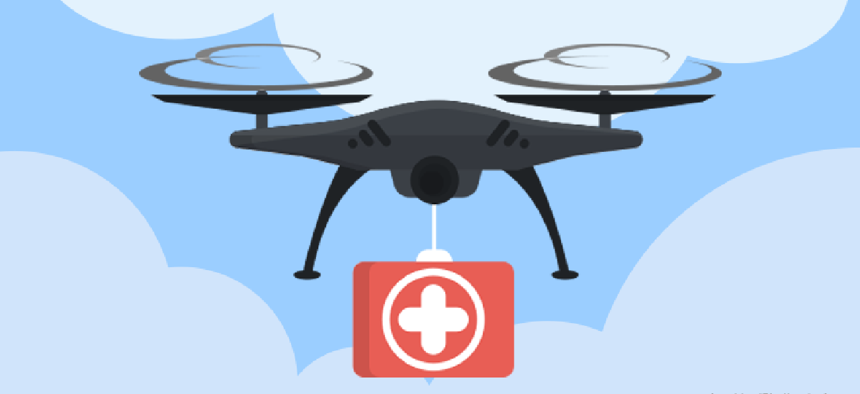Getting blood to wounded troops via drone

The Pentagon's experimental unit wants ideas on how to use drones to deliver medical supplies to troops in remote locations.
On the battlefield, drones are typically used to get a remote view of enemy positions. Now the Pentagon wants ideas on how unmanned aerial systems can be used to deliver blood and medical supplies to remote locations to treat wounded troops on the spot.
The Defense Innovation Unit Experimental said it wants to be able to deliver a 5-pound package over 100 kilometers in "austere environments," suggesting that they're looking at an unmanned aerial vehicle system that supports refrigeration or other means of temperature control.
"These deliveries, ideally automated, will provide essential items to critically wounded military personnel as quickly as possible after an injury occurs," the April 23 solicitation states. "Ability to sustain a very high frequency of operations over an extended period of time is critical. Speed of delivery, reliability and robustness to failure and interference, response time, and overall delivery throughput are critical."
Similar efforts are underway elsewhere in the Department of Defense. The Marine Corps' Next Generation Logistics branch and DOD’s Rapid Reaction Technology Office, for example, recently tested the Hive Final Mile project, which aims to resupply troops on the battlefield via drone. That system involves a mobile application for placing orders, an automated drone launcher, software for determining what drone to fly and managing flight paths, and a cloud storage component for keeping track of all the flights and orders.
Additionally, Zipline -- a Silicon Valley startup that currently delivers blood by drone in Rwanda -- is partnering with the North Carolina Department of Transportation on its bid for participation in the Federal Aviation Administration's Unmanned Aerial Systems Integration Pilot Program, proposing to use drones to deliver medical supplies across the state.
And medical-supply delivery by drone already has been tested stateside. Early efforts in the area include NASA’s Langley Research Center’s work in 2015 with the drone company Flirtey to deliver supplies to free clinics in Wise County, Va.
DIUx is looking for solutions from vendors by May 1, with an eye to fielding a system within two to three months. Read the request for solution briefs here.
This article was first posted to FCW, a sibling site to GCN.






